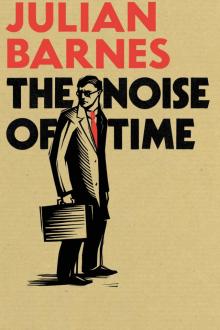- Home
- Julian Barnes
Cross Channel Page 9
Cross Channel Read online
Page 9
Poor Denis. He was still handsome when he came back, though his hair grew white on one side and he dribbled. When the fits came on she knelt on his chest and held his tongue down with a stub of pencil. Every night he roamed restlessly through his sleep, muttered and roared, fell silent for a while, and then with parade-ground precision would shout Hip! hip! hip! When she woke him, he could never remember what had been happening. He had guilt and pain, but no specific memory of what he felt guilty about. She knew: Denis had been hit by shrapnel and taken back down the line to hospital without a farewell to his best pal Jewy Moss, leaving Sammy to be killed during the next day’s Hun bombardment. After two years of this marriage, two years of watching Denis vigorously brush his patch of white hair to make it go away, she had returned him to his sisters. From now on, she told them, they should look after Denis and she would look after Sam. The sisters had gazed at her in silent astonishment. Behind them, in the hall, Denis, his chin wet and his brown eyes uncomprehending, stood with an awkward patience which implied that this latest event was nothing special in itself, merely one of a number of things he failed to grasp, and that there would surely be much more to come, all down the rest of his life, which would also escape him.
She had taken the job on the Dictionary a month later. She worked alone in a damp basement, at a desk across which curled long sheets of galley-proof. Condensation beaded the window. She was armed with a brass table-lamp and a pencil which she sharpened until it was too short to fit in the hand. Her script was large and loose, somewhat like Sammy’s; she deleted and inserted, just as he had done on his field-service postcards. Nothing to be written on this side of the galley-proof. If anything else is added to the galley-proof it will be destroyed. No, she did not have to worry; she made her marks with impunity. She spotted colons which were italic instead of roman, brackets which were square instead of round, inconsistent abbreviations, misleading cross-references. Occasionally she made suggestions. She might observe, in looping pencil, that such-and-such a word was in her opinion vulgar rather than colloquial, or that the sense illustrated was figurative rather than transferred. She passed on her galley-proofs to Mr Rothwell, the joint deputy editor, but never enquired whether her annotations were finally acted upon. Mr Rothwell, a bearded, taciturn and pacific man, valued her meticulous eye, her sure grasp of the Dictionary’s conventions, and her willingness to take work home if a fascicle was shortly going to press. He remarked to himself and to others that she had a strangely disputatious attitude over words labelled as obsolete. Often she would propose ?Obs. rather than Obs. as the correct marking. Perhaps this had something to do with age, Mr Rothwell thought; younger folk were perhaps more willing to accept that a word had had its day.
In fact, Mr Rothwell was only five years younger than she; but Miss Moss - as she had become once more after her disposal of Denis - had aged quickly, almost as a matter of will. The years passed and she grew stout, her hair flew a little more wildly away from her clips, and her spectacle lenses became thicker. Her stockings had a dense, antique look to them, and she never took her raincoat to the dry-cleaner. Younger lexicographers entering her office, where a number of back files were stored, wondered if the faint smell of rabbit-hutch came from the walls, the old Dictionary slips, Miss Moss’s raincoat, or Miss Moss herself. None of this mattered to Mr Rothwell, who saw only the precision of her work. Though entitled by the Press to an annual holiday of fifteen working days, she never took more than a single week.
At first this holiday coincided with the eleventh hour of the eleventh day of the eleventh month; Mr Rothwell had the delicacy not to ask for details. In later years, however, she would take her week in other months, late spring or early autumn. When her parents died and she inherited a small amount of money, she surprised Mr Rothwell by arriving for work one day in a small grey Morris with red leather seats. It sported a yellow metal AA badge on the front and a metal GB plate on the back. At the age of fifty-three she had passed her driving-test first time, and manoeuvred her car with a precision bordering on elan.
She always slept in the car. It saved money; but mainly it helped her be alone with herself and Sam. The villages in that thinned triangle south of Arras became accustomed to the sight of an ageing British car the colour of gunmetal drawn up beside the war memorial; inside, an elderly lady wrapped in a travelling-rug would be asleep in the passenger seat. She never locked the car at night, for it seemed impertinent, even disrespectful on her part to feel any fear. She slept while the villages slept, and would wake as a drenched cow on its way to milking softly shouldered a wing of the parked Morris. Every so often she would be invited in by a villager, but she preferred not to accept hospitality. Her behaviour was not regarded as peculiar, and cafés in the region knew to serve her thé à l’anglaise without her having to ask.
After she had finished with Thiepval, with Thistle Dump and Caterpillar Valley, she would drive up through Arras and take the D937 towards Béthune. Ahead lay Vimy, Cabaret Rouge, N.D. de Lorette. But there was always one other visit to be paid first: to Maison Blanche. Such peaceful names they mostly had. But here at Maison Blanche were 40,000 German dead, 40,000 Huns laid out beneath their thin black crosses, a sight as orderly as you would expect from the Huns, though not as splendid as the British graves. She lingered there, reading a few names at random, idly wondering, when she found a date just a little later than the 21st January 1917, if this could be the Hun that had killed her Sammy. Was this the man who squeezed the trigger, fed the machine-gun, blocked his ears as the howitzer roared? And see how short a time he had lasted afterwards: two days, a week, a month or so in the mud before being lined up in known and honoured burial, facing out once more towards her Sammy, though separated now not by barbed-wire and 50 yds but by a few kilometres of asphalt.
She felt no rancour towards these Huns; time had washed from her any anger at the man, the regiment, the Hun army, the nation that had taken Sam’s life. Her resentment was against those who had come later, and whom she refused to dignify with the amicable name of Hun. She hated Hitler’s war for diminishing the memory of the Great War, for allotting it a number, the mere first among two. And she hated the way in which the Great War was held responsible for its successor, as if Sam, Denis and all the East Lancashires who fell were partly the cause of that business. Sam had done what he could - he had served and died - and was punished all too quickly with becoming subservient in memory. Time did not behave rationally. Fifty years back to the Somme; a hundred beyond that to Waterloo; four hundred more to Agincourt, or Azincourt as the French preferred. Yet these distances had now been squeezed closer to one another. She blamed it on 1939-1945.
She knew to keep away from those parts of France where the second war happened, or at least where it was remembered. In the early years of the Morris, she had sometimes made the mistake of imagining herself on holiday, of being a tourist. She might thoughtlessly stop in a lay-by, or be taking a stroll down a back lane in some tranquil, heat-burdened part of the country, when a neat tablet inserted in a dry wall would assault her. It would commemorate Monsieur Un Tel, lâchement assassiné par les Allemands, or tué, or fusillé, and then an insulting modern date: 1943, 1944, 1945. They blocked the view, these deaths and these dates; they demanded attention by their recency. She refused, she refused.
When she stumbled like this upon the second war, she would hurry to the nearest village for consolation. She always knew where to look: next to the church, the mairie, the railway station; at a fork in the road; on a dusty square with cruelly pollarded limes and a few rusting café tables. There she would find her damp-stained memorial with its heroic poilu, grieving widow, triumphant Marianne, rowdy cockerel. Not that the story she read on the plinth needed any sculptural illustration. 67 against 9, 83 against 12, 40 against 5, 27 against 2: here was the eternal corroboration she sought, the historical corrigendum. She would touch the names cut into stone, their gilding washed away on the weather-side. Numbers whose familiar proportion declared the
terrible primacy of the Great War. Her eye would check down the bigger list, snagging at a name repeated twice, thrice, four, five, six times: one male generation of an entire family taken away to known and honoured burial. In the bossy statistics of death she would find the comfort she needed.
She would spend the last night at Aix-Noulette (101 to 7); at Souchez (48 to 6), where she remembered Plouvier, Maxime, Sergent, killed on 17th December 1916, the last of his village to die before her Sam; at Carency (19 to 1); at Ablain-Saint-Nazaire (66 to 9), eight of whose male Lherbiers had died, four on the champ d’honneur, three as victimes civiles, one a civil fusillé par l’ennemi. Then, the next morning, cocked with grief, she would set off for Cabaret Rouge while dew was still on the grass. There was consolation in solitude and damp knees. She no longer talked to Sam; everything had been said decades ago. The heart had been expressed, the apologies made, the secrets given. She no longer wept, either; that too had stopped. But the hours she spent with him at Cabaret Rouge were the most vital of her life. They always had been.
The D937 did its reminding elbow at Cabaret Rouge, making sure you slowed out of respect, drawing your attention to Brigadier Sir Frank Higginson’s handsome domed portico, which served as both entrance gate and memorial arch. From the portico, the burial ground dropped away at first, then sloped up again towards the standing cross on which hung not Christ but a metal sword. Symmetrical, amphitheatrical, Cabaret Rouge held 6,676 British soldiers, sailors, Marines and airmen; 732 Canadians; 121 Australians; 42 South Africans; 7 New Zealanders; 2 members of the Royal Guernsey Light Infantry; 1 Indian; 1 member of an unknown unit; and 4 Germans.
It also contained, or more exactly had once had scattered over it, the ashes of Brigadier Sir Frank Higginson, Secretary to the Imperial War Graves Commission, who had died in 1958 at the age of sixty-eight. That showed true loyalty and remembrance. His widow, Lady Violet Lindsley Higginson, had died four years later, and her ashes had been scattered here too. Fortunate Lady Higginson. Why should the wife of a brigadier who, whatever he had done in the Great War, had not died, be allowed such enviable and meritorious burial, and yet the sister of one of those soldiers whom the fortune of war had led to known and honoured burial be denied such comfort? The Commission had twice denied her request, saying that a military cemetery did not receive civilian ashes. The third time she had written they had been less polite, referring her brusquely to their earlier correspondence.
There had been incidents down the years. They had stopped her coming for the eleventh hour of the eleventh day of the eleventh month by refusing her permission to sleep the night beside his grave. They said they did not have camping facilities; they affected to sympathise, but what if everybody else wanted to do the same? She replied that it was quite plain that no one else wanted to do the same but that if they did then such a desire should be respected. However, after some years she ceased to miss the official ceremony: it seemed to her full of people who remembered improperly, impurely.
There had been problems with the planting. The grass at the cemetery was French grass, and it seemed to her of the coarser type, inappropriate for British soldiers to lie beneath. Her campaign over this with the Commission led nowhere. So one spring she took out a small spade and a square yard of English turf kept damp in a plastic bag. After dark she dug out the offending French grass and relaid the softer English turf, patting it into place, then stamping it in. She was pleased with her work, and the next year, as she approached the grave, saw no indication of her mending. But when she knelt, she realised that her work had been undone: the French grass was back again. The same had happened when she had surreptitiously planted her bulbs. Sam liked tulips, yellow ones especially, and one autumn she had pushed half a dozen bulbs into the earth. But the following spring, when she returned, there were only dusty geraniums in front of his stone.
There had also been the desecration. Not so very long ago. Arriving shortly after dawn, she found something on the grass which at first she put down to a dog. But when she saw the same in front of 1685 Private W. A. Andrade 4th Bn. London Regt. R. Fus. 15th March 1915, and in front of 675 Private Leon Emanuel Levy The Cameronians (Sco. Rif.) 16th August 1916 aged 21 And the Soul Returneth to God Who Gave It - Mother, she judged it most unlikely that a dog, or three dogs, had managed to find the only three Jewish graves in the cemetery. She gave the caretaker the rough edge of her tongue. He admitted that such desecration had occurred before, also that paint had been sprayed, but he always tried to arrive before anyone else and remove the signs. She told him that he might be honest but he was clearly idle. She blamed the second war. She tried not to think about it again.
For her, now, the view back to 1917 was uncluttered: the decades were mown grass, and at their end was a row of white headstones, domino-thin. 1358 Private Samuel M. Moss East Lancashire Regt. 21st January 1917, and in the middle the Star of David. Some graves in Cabaret Rouge were anonymous, with no identifying words or symbols; some had inscriptions, regimental badges, Irish harps, springboks, maple leaves, New Zealand ferns. Most had Christian crosses; only three displayed the Star of David. Private Andrade, Private Levy and Private Moss. A British soldier buried beneath the Star of David: she kept her eyes on that. Sam had written from training camp that the fellows chaffed him, but he had always been Jewy Moss at school, and they were good fellows, most of them, as good inside the barracks as outside, anyway. They made the same remarks he’d heard before, but Jewy Moss was a British soldier, good enough to fight and die with his comrades, which is what he had done, and what he was remembered for. She pushed away the second war, which muddled things. He was a British soldier, East Lancashire Regiment, buried at Cabaret Rouge beneath the Star of David.
She wondered when they would plough them up, Herbécourt, Devonshire, Quarry, Blighty Valley, Ulster Tower, Thistle Dump and Caterpillar Valley; Maison Blanche and Cabaret Rouge. They said they never would. This land, she read everywhere, was ‘the free gift of the French people for the perpetual resting place of those of the allied armies who fell…’ and so on. EVERMORE, they said, and she wanted to hear: for all future time. The War Graves Commission, her successive members of parliament, the Foreign Office, the commanding officer of Sammy’s regiment, all told her the same. She didn’t believe them. Soon — in fifty years or so — everyone who had served in the War would be dead; and at some point after that, everyone who had known anyone who had served would also be dead. What if memory-grafting did not work, or the memories themselves were deemed shameful? First, she guessed, those little stone tablets in the back lanes would be chiselled out, since the French and the Germans had officially stopped hating one another years ago, and it would not do for German tourists to be accused of the cowardly assassinations perpetrated by their ancestors. Then the war memorials would come down, with their important statistics. A few might be held to have architectural interest; but some new, cheerful generation would find them morbid, and dream up better things to enliven the villages. And after that it would be time to plough up the cemeteries, to put them back to good agricultural use: they had lain fallow for too long. Priests and politicians would make it all right, and the farmers would get their land back, fertilised with blood and bone. Thiepval might become a listed building, but would they keep Brigadier Sir Frank Higginson’s domed portico? That elbow in the D937 would be declared a traffic hazard; all it needed was a drunken casualty for the road to be made straight again after all these years. Then the great forgetting could begin, the fading into the landscape. The war would be levelled to a couple of museums, a set of demonstration trenches, and a few names, shorthand for pointless sacrifice.
Might there be one last fiery glow of remembering? In her own case, it would not be long before her annual renewals ceased, before the clerical error of her life was corrected; yet even as she pronounced herself an antique, her memories seemed to sharpen. If this happened to the individual, could it not also happen on a national scale? Might there not be, at some point in the first dec
ades of the twenty-first century, one final moment, lit by evening sun, before the whole thing was handed over to the archivists? Might there not be a great looking-back down the mown grass of the decades, might not a gap in the trees discover the curving ranks of slender headstones, white tablets holding up to the eye their bright names and terrifying dates, their harps and springboks, maple leaves and ferns, their Christian crosses and their Stars of David? Then, in the space of a wet blink, the gap in the trees would close and the mown grass disappear, a violent indigo cloud would cover the sun, and history, gross history, daily history, would forget. Is this how it would be?
GNOSSIENNE
LET ME MAKE IT CLEAR that I never attend literary conferences. I know that they’re held in art deco hotels close to legendary museums; that sessions on the future of the novel are conducted with Kameradschaft, brio and bonhomie; that the impromptu friendships always endure; and that after the work is done you may savour hard liquor, soft drugs and a fair slither of sex. Taxi-drivers in Frankfurt are said to dislike the annual Book Fair because literary folk, instead of being shuttled to prostitutes like respectable members of other convening professions, prefer to stay in their hotels and fuck one another. I also know that literary conferences are held in mafia-built blocks whose air-conditioning throbs with typhoid, tetanus and diphtheria; that the organisers are international snobs seeking local tax write-offs; that delegates covet the free air-ticket and the chance to bore their rivals in several different languages simultaneously; that in the presumed democracy of art everyone acknowledges and consequently resents their place in the true hierarchy; and that not a single novelist, poet, essayist or even journalist has ever left that mafia hotel a better writer than he or she entered it. I know all this, as I say, because I have never attended a single literary conference.

 The Sense of an Ending
The Sense of an Ending The Noise of Time
The Noise of Time Metroland
Metroland Letters From London
Letters From London Before She Met Me
Before She Met Me Pulse
Pulse Flaubert's Parrot
Flaubert's Parrot England, England
England, England The Porcupine
The Porcupine The Only Story
The Only Story Love, Etc
Love, Etc Through the Window: Seventeen Essays and a Short Story
Through the Window: Seventeen Essays and a Short Story Staring at the Sun
Staring at the Sun Cross Channel
Cross Channel Levels of Life
Levels of Life Arthur & George
Arthur & George Love, Etc.
Love, Etc. A History of the World in 10 1/2 Chapters
A History of the World in 10 1/2 Chapters Something to Declare
Something to Declare Through the Window: Seventeen Essays and a Short Story (Vintage International)
Through the Window: Seventeen Essays and a Short Story (Vintage International)